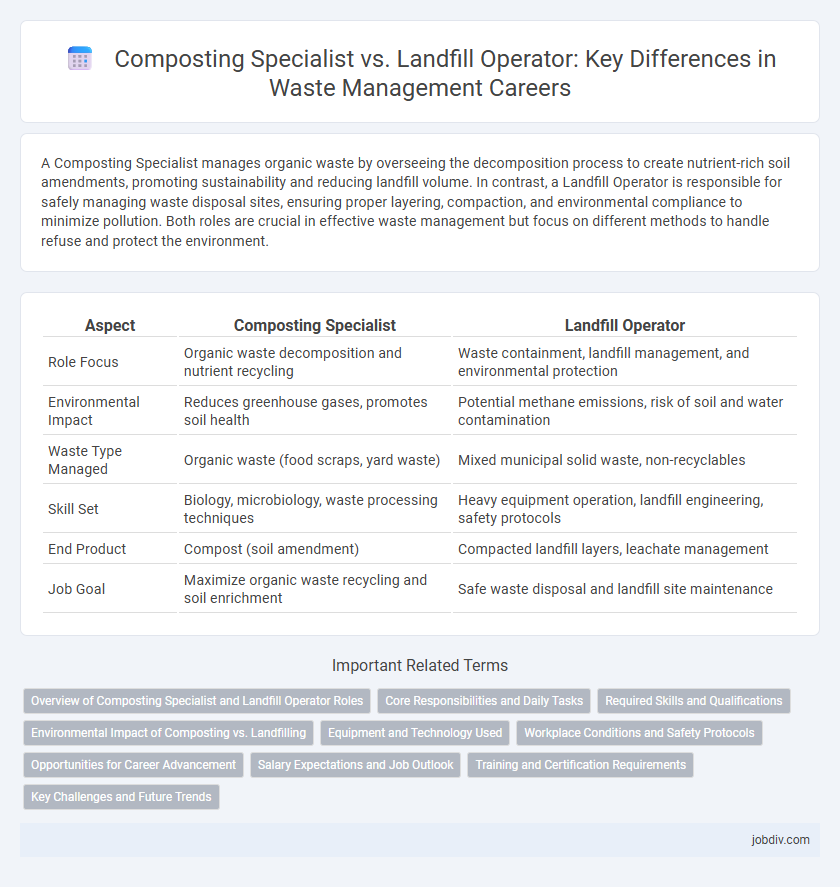A Composting Specialist manages organic waste by overseeing the decomposition process to create nutrient-rich soil amendments, promoting sustainability and reducing landfill volume. In contrast, a Landfill Operator is responsible for safely managing waste disposal sites, ensuring proper layering, compaction, and environmental compliance to minimize pollution. Both roles are crucial in effective waste management but focus on different methods to handle refuse and protect the environment.
Table of Comparison
| Aspect | Composting Specialist | Landfill Operator |
|---|---|---|
| Role Focus | Organic waste decomposition and nutrient recycling | Waste containment, landfill management, and environmental protection |
| Environmental Impact | Reduces greenhouse gases, promotes soil health | Potential methane emissions, risk of soil and water contamination |
| Waste Type Managed | Organic waste (food scraps, yard waste) | Mixed municipal solid waste, non-recyclables |
| Skill Set | Biology, microbiology, waste processing techniques | Heavy equipment operation, landfill engineering, safety protocols |
| End Product | Compost (soil amendment) | Compacted landfill layers, leachate management |
| Job Goal | Maximize organic waste recycling and soil enrichment | Safe waste disposal and landfill site maintenance |
Overview of Composting Specialist and Landfill Operator Roles
Composting specialists manage organic waste by overseeing the decomposition process to produce nutrient-rich compost, enhancing soil health and reducing landfill use. Landfill operators control the disposal of non-recyclable and non-compostable waste, ensuring proper containment and environmental safety to prevent pollution. Both roles are critical in waste management, balancing sustainable organic recycling with secure waste containment.
Core Responsibilities and Daily Tasks
Composting specialists manage organic waste decomposition through aerobic processes, enhancing soil health by converting food scraps and yard waste into nutrient-rich compost. Landfill operators oversee the safe disposal and containment of non-recyclable waste, maintaining landfill liners and gas collection systems to prevent environmental contamination. Both roles require monitoring waste treatment efficiency and ensuring compliance with environmental regulations, but composting specialists focus on biological recycling while landfill operators prioritize waste stabilization and site safety.
Required Skills and Qualifications
Composting specialists require expertise in organic waste management, soil science, and microbiology, alongside skills in monitoring composting processes and ensuring environmental compliance. Landfill operators need qualifications in heavy equipment operation, waste disposal regulations, and safety protocols, with strong abilities in site maintenance and waste segregation. Both roles demand knowledge of environmental laws and strong problem-solving skills to manage waste sustainably and efficiently.
Environmental Impact of Composting vs. Landfilling
Composting specialists significantly reduce greenhouse gas emissions by converting organic waste into nutrient-rich soil amendments, enhancing soil health and reducing reliance on chemical fertilizers. Landfill operators manage waste accumulation that generates methane, a potent greenhouse gas, and contributes to long-term environmental degradation due to leachate contamination risks. Composting supports circular economy principles, promoting sustainable waste management with lower carbon footprints compared to the high environmental impact associated with landfilling organic materials.
Equipment and Technology Used
Composting specialists utilize advanced aerobic composting systems, including in-vessel composters and aerated static piles, to efficiently break down organic waste using controlled temperature and oxygen levels. Landfill operators rely on heavy machinery such as bulldozers, compactors, and gas collection systems to manage waste disposal and methane capture in large-scale landfill sites. Both professions incorporate emerging technologies like landfill gas-to-energy systems and automated monitoring sensors, optimizing waste management processes and environmental impact control.
Workplace Conditions and Safety Protocols
Composting specialists work in environments with high organic material exposure, requiring strict use of personal protective equipment (PPE) to manage bioaerosols and odor control safely. Landfill operators face heavier physical demands, operating heavy machinery and managing potential hazards like methane gas leaks and unstable terrain, necessitating rigorous safety training and regular monitoring for toxic gas exposure. Both roles prioritize compliance with Occupational Safety and Health Administration (OSHA) standards, but composting specialists focus more on biological and microbial risks while landfill operators contend with mechanical and chemical dangers.
Opportunities for Career Advancement
Composting specialists have growing career opportunities as sustainability and organic waste management gain global priority, with potential roles in environmental consultancy and waste reduction strategy development. Landfill operators can advance by acquiring certifications in environmental compliance and management or moving into supervisory positions overseeing multiple sites. Both careers benefit from increasing regulatory focus on waste diversion and resource recovery, driving demand for expertise in innovative waste treatment technologies.
Salary Expectations and Job Outlook
Composting specialists typically earn between $40,000 and $60,000 annually, with job growth expected at 8% through 2031 due to increasing environmental awareness and sustainability efforts. Landfill operators have a median salary of around $45,000, but job prospects are projected to decline by 2% as landfills close and waste management shifts toward recycling and composting. The growing demand for organic waste processing favors composting specialists, making their career outlook more promising compared to landfill operators.
Training and Certification Requirements
Composting specialists typically require training in organic waste management, soil science, and environmental regulations, often obtaining certifications like the Composting Management Professional credential to ensure expertise in sustainable decomposition processes. Landfill operators must complete comprehensive safety and operational training, frequently securing certifications such as the Landfill Operator Certification, which covers landfill construction, maintenance, and regulatory compliance. Both roles demand ongoing education to stay updated with evolving environmental laws and best practices in waste management.
Key Challenges and Future Trends
Composting specialists face challenges in optimizing organic waste degradation and managing contamination to produce high-quality compost, while landfill operators struggle with methane gas emissions and long-term site sustainability. Future trends emphasize advanced biotechnologies for accelerating composting processes and enhanced landfill gas capture systems integrating renewable energy recovery. Both roles are increasingly adopting digital monitoring tools to improve operational efficiency and environmental compliance.
Composting Specialist vs Landfill Operator Infographic

 jobdiv.com
jobdiv.com